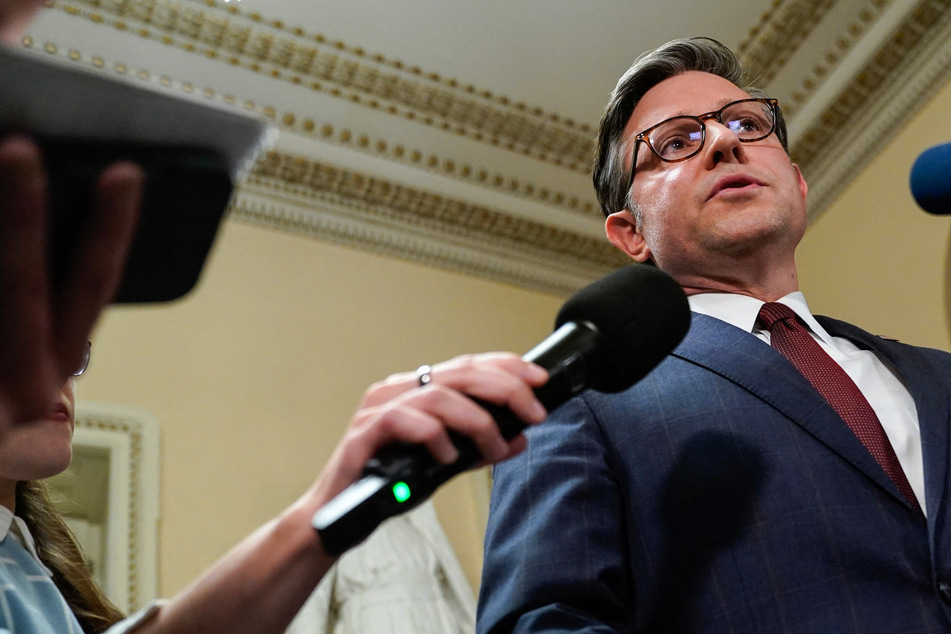House passes bills to aid Ukraine, bolster Taiwan, and threaten TikTok ban
Washington DC - Lawmakers in the House of Representatives on Saturday quickly passed legislation to provide to Ukraine and Israel and bolster Taiwan while also threatening a ban on TikTok if it fails to divest from Beijing.

The bills, passed in a rare Saturday session, were approved by overwhelming bipartisan votes, though they leave the future of House Speaker Mike Johnson in doubt as he seeks to fend off angry far-right detractors.
Ukraine's President Volodymyr Zelensky welcomed the long-delayed aid package, saying the military and economic assistance would "save thousands and thousands of lives."
The bills are the product of months of acrimonious negotiations, pressure from US allies, and repeated pleas for assistance from Zelensky.
Spending bills cost the last Republican speaker of the House his job, and funding for Ukraine has been at the heart of the partisan squabbling.
The United States has been the chief military backer of Ukraine in its war against Russia, but Congress has not approved large-scale funding for its ally for nearly a year and a half, mainly because of the cross-aisle bickering.
President Joe Biden and Democratic lawmakers in Congress have been pushing for a major new weapons package for Ukraine for months. But Republicans, influenced by the party's presidential candidate Donald Trump, have been reluctant to provide funding to Kyiv for the drawn-out conflict.
Zelensky praises House's approval of aid to Ukraine

The financing of the war has become a point of contention ahead of a presidential election in November that is expected to pit Biden against Trump once again.
Johnson, after months of hesitation, finally threw his support behind the $61 billion package for Ukraine that includes economic assistance and weapons.
"To put it bluntly, I'd rather send bullets to Ukraine than American boys," Johnson said.
Writing on social media after the bill was passed, Ukraine's Zelensky expressed hope that the bill would soon clear the Senate and be signed into law by Biden. "Thank you, America!" he added.
The bill also allows Biden to confiscate and sell Russian assets and provide the money to Ukraine to finance reconstruction, a move that has been embraced by other G7 nations.
The upper chamber could take the bill up as early as Tuesday, Senate Democratic leader Chuck Schumer said.
At the request of President Joe Biden, some $8 billion under one bill would be used to counter China through investment in submarine infrastructure and boosting competition with Beijing on projects built in developing countries.
Several billion dollars would be devoted to weapons for Taiwan, the self-ruled island that is claimed by China.
TikTok faces potential ban as US provides more funds for Israel

The first of the bills passed Saturday would force TikTok to divest from its Chinese parent company, ByteDance, or face a nationwide ban in the United States, where it has around 170 million users.
Western officials have voiced alarm over the popularity of TikTok with young people, alleging that it is subservient to Beijing and a conduit to spread propaganda – claims denied by the company.
TitTok sharply denounced the bill, saying it "would trample the free speech rights of 170 million Americans, devastate seven million businesses, and shutter a platform that contributes $24 billion to the US economy annually," a TikTok spokesman said.
A total of $13 billion in military assistance has been allocated for America's historic ally Israel in its war against Hamas in Gaza.
The money will essentially be used to reinforce Israel's Iron Dome air defenses.
More than $9 billion will be earmarked to address "the dire need for humanitarian assistance for Gaza as well as other vulnerable populations around the world," the legislation says.
US allies are expected to warmly welcome passage of the bills in the House, but it could cost the Republican House speaker his job.
A handful of far-right isolationist Republican lawmakers have warned they may oust Johnson for supporting the bills.
Cover photo: DREW ANGERER / AFP

